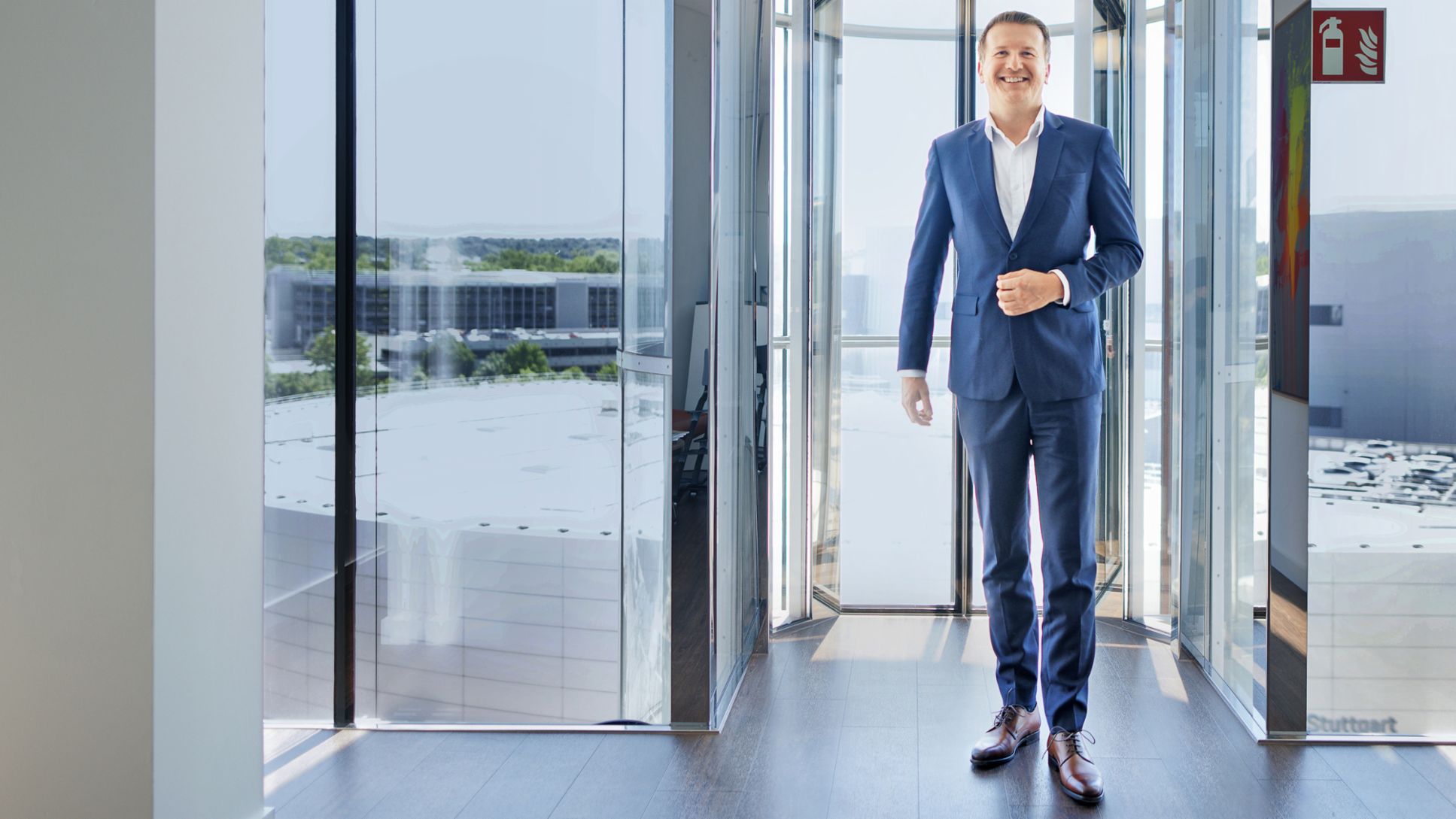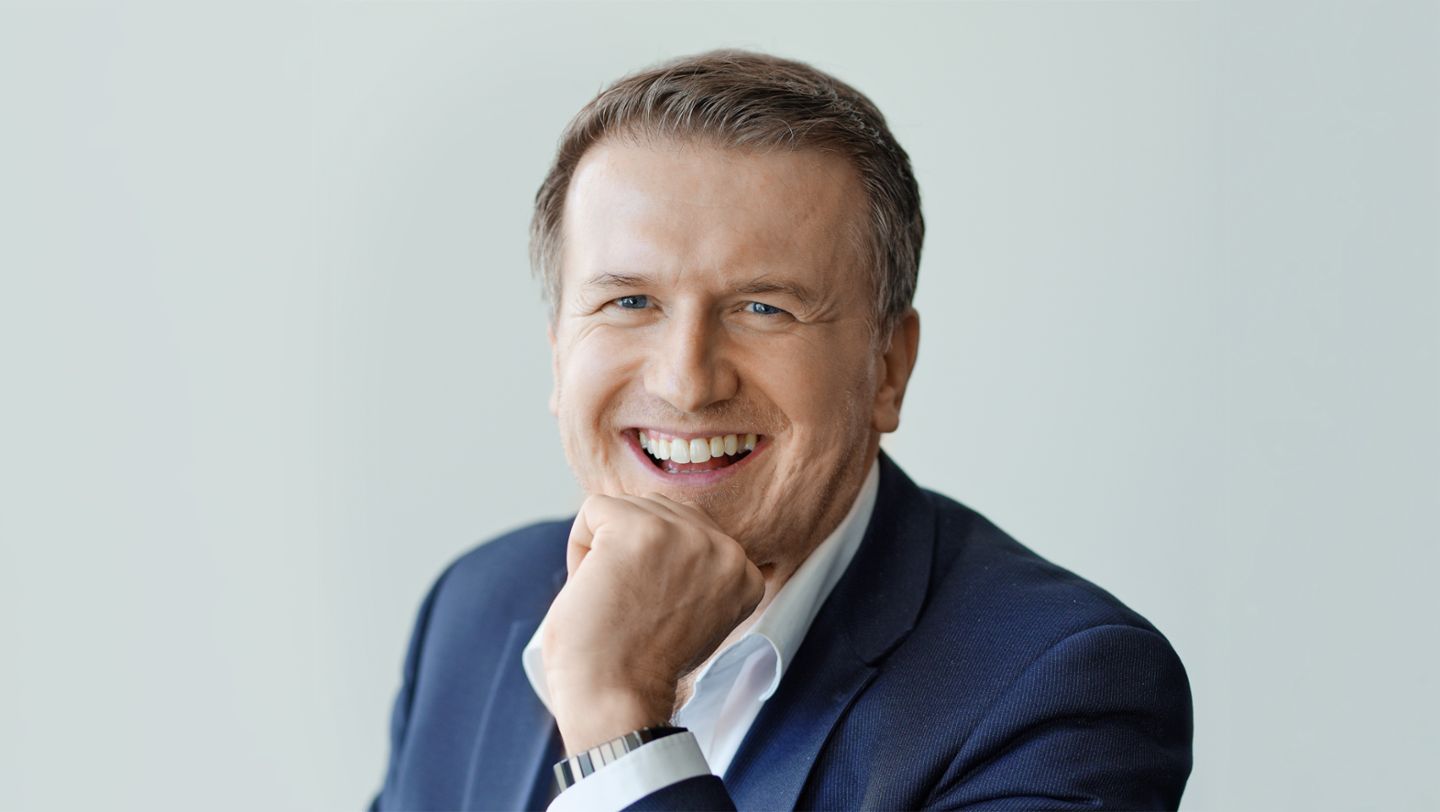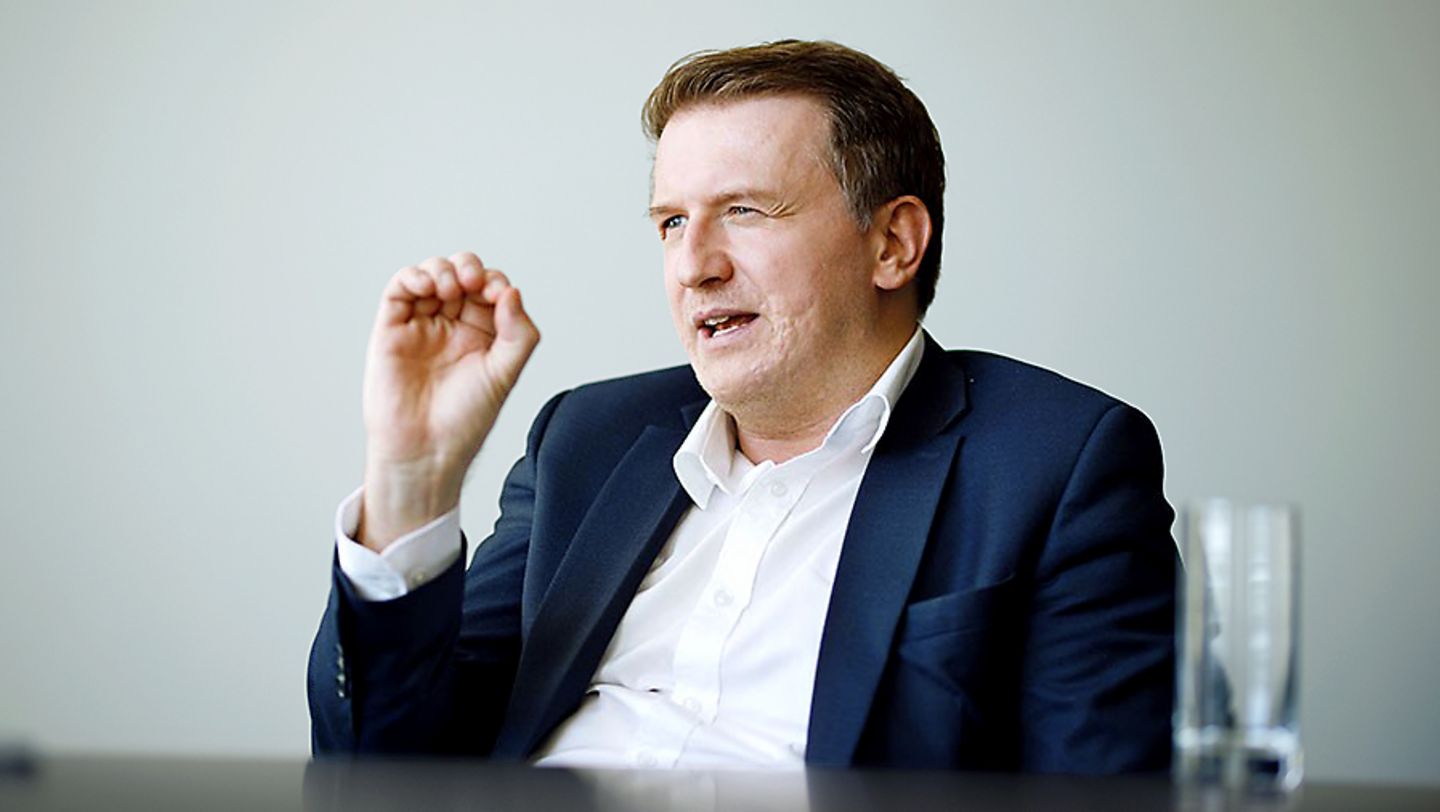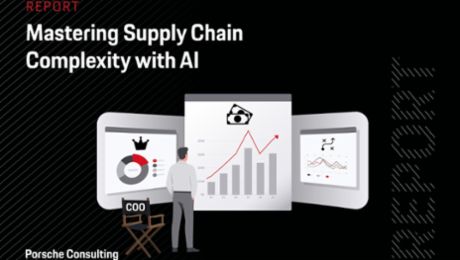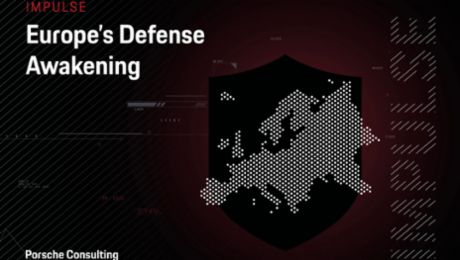Dr. Erwin Gabardi doesn’t beat around the bush. “If Volkswagen doesn’t have similar success with its e‑cars in China as it does with combustion engines, it’ll have a problem—by 2025 the country will account for 45 to 55 percent of the NEV market,” he says. The NEV—or New Energy Vehicle—market in China refers to cars with alternative drive systems, including battery-powered e‑cars, plug-in hybrids, and vehicles with fuel cells.
Gabardi, an Austrian with two doctorates, is refreshingly open in his analyses as well. “In China you have to know exactly what customers are looking for in NEVs, which often means completely different things than the rest of the world and might not have anything to do with electromobility per se,” he says. “Volkswagen has some catching up to do here.”
That being said, Gabardi doesn’t leave the impression he’s losing any sleep over the matter. On the contrary, he is much more focused on the opportunities for Volkswagen. In the summer of 2021 he became Chief Executive Officer of Volkswagen Anhui Automotive Company Ltd., which means he directs the latest VW joint venture for electric cars in Hefei in the province of Anhui. Located around 500 kilometers west of Shanghai with a population of nearly ten million, Hefei is home to major industries (cars, electronics, semiconductors, biotech, and medicine) and is one of the country’s leading centers of higher education. In late 2020, Volkswagen increased its share of the JAC Volkswagen joint venture to 75 percent and took over the management, which gives it free rein in day-to-day operations.
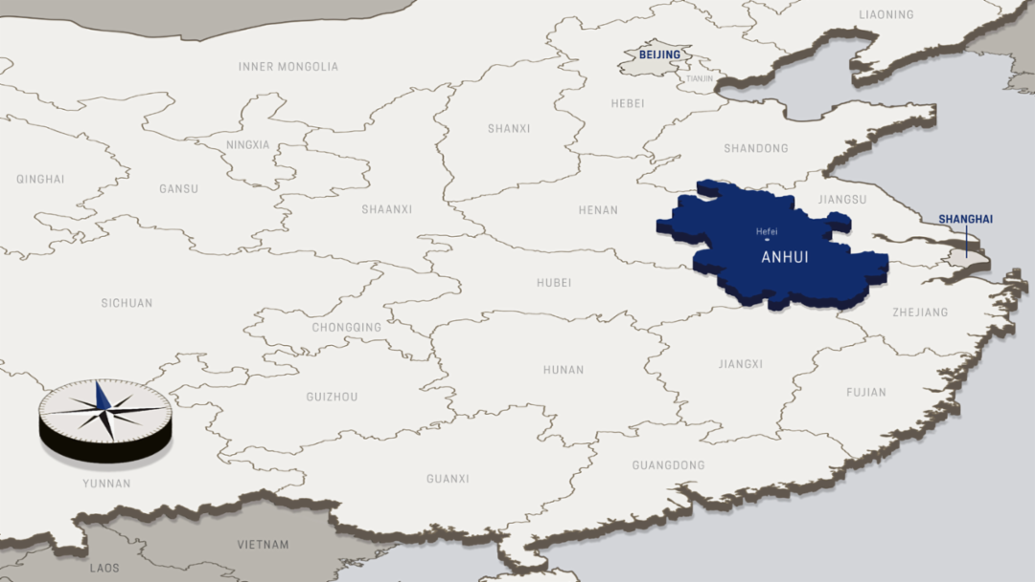
Within the Volkswagen corporation, the position in Hefei is considered crucial for business in China. That is where the company’s e‑mobility breakthrough in the world’s largest car market is expected—or rather will have to—take place. Gabardi comes across in the interview as well aware of the task and only too happy to take it on. He explains the quirks of certain charging stations in passionate detail, describes clearance measures as quality criteria for car bodies, and marvels at but doesn’t belittle Chinese customer wishes for features such as on-board karaoke.
The largest market runs by its own rules
No one can underestimate customer wishes (anymore) on the world’s leading market for electric vehicles. A record number of nearly three million e‑cars were sold in China in 2021, and the country’s automotive association expects the figure to increase by up to 5.5 million for 2022. The market, however, is firmly in Chinese hands. Of the ten top-selling manufacturers in 2021, not one was from Europe, and the only western maker was Tesla.
Gabardi acknowledges the success of the competition without a trace of envy. He is fascinated by the development trajectories of local providers like BYD, X‑Peng, and Nio. “Our Chinese competitors have become incredibly powerful in the NEV sector,” he observes. “Their cars have state-of-the-art functions and design, and are comparatively inexpensive. We’re taking a close look at them and analyzing the situation with our colleagues in Wolfsburg.”
One insight is that European combustion engines have largely lost their competitive edge. As for driving comfort and experience, the Chinese models are comparable “and also have infotainment and connectivity features tailored to their customers,” explains Gabardi.
That is precisely where Volkswagen Anhui needs to get moving. For example, Chinese cars have on-board karaoke and selfie capacities. They also have smart-home functions and apps that can make restaurant reservations. “It doesn’t occur to us to want something like karaoke in our cars,” he remarks, “but the Chinese think it’s cool. The selling points are no longer the engineering expertise or the clearance measures, but a range of colorful gimmicks.”
The CEO of Volkswagen Anhui Automotive recognizes there’s work to be done. The priority right now, therefore, is to catch up. “In terms of features, we first have to make cars that can hold their own with local competitors while retaining our special characteristics like quality, dependability, and safety,” he says. “The next step will be to define new services and features.”
The “In China, for China” principle
The guiding principle here is the idea of “In China, for China.” As far as production goes, around 90 percent of cars sold in China are already made at local plants, which now number more than 40. Innovative technologies and digital services are also expected to be developed locally. Hefei will be playing an important role here.
A new research and development center was therefore dedicated back in December of 2020. Development speed will play a crucial role in future success. As Gabardi explains, “Our Chinese competitors can put a karaoke feature into a car in two or three months, but we need about a year. We’ll have to change that, and put customer wishes into practice more quickly.” The processes also have to become more streamlined and agile. “We can’t discuss every detail with the headquarter in Germany any longer—for me that’s also part of the ‘In China, for China’ idea. We want to make decisions for the Chinese market here in China in the future.”
Development, production, and sales – all in one place
In addition to research and development, Hefei will bring quality assurance, simultaneous engineering, and pre-series production together and also integrate them throughout the value chain. Moreover, the newly founded Digital Sales and Services subsidiary is charged with adding precisely those activities to the value chain. Its job is to create direct customer interfaces at various online and offline points of contact, and to develop mobility and connectivity services and options designed specifically for Chinese customers.
The complete e‑car factory with a peak annual capacity of 350,000 vehicles is “essentially finished,” reports Gabardi. “We’ve already made the first body in white. The first actual car is scheduled to leave the factory for testing in September 2022, and production cars are supposed to start rolling from the Hefei assembly line in the fourth quarter of 2023.”
In 2020 Volkswagen invested two billion euros in Hefei: half in the joint venture with JAC and the other half in the Gotion battery maker to secure a supply of that crucial component for the Chinese e‑cars.
That investment package has also helped ensure excellent relations with the local government. Good relations with local governments are one of the guarantors for success in China, says Gabardi. “We’re not only investing in the company but also in the city of Hefei, which means we’re helping the local economy create value.” The fact that a German corporation made this billion-level investment during the Covid-fueled economic crisis in 2020 “will not be forgotten,” says Gabardi. That’s why there’s a “very good and extremely direct link” to key personnel, and relations “are quite friendly,” says the top-level manager.
It would therefore appear that Volkswagen has found ideal conditions for its electromobility hub in a relatively low-profile part of the country, even among Chinese. And when you listen to Erwin Gabardi, you definitely think that Volkswagen Anhui is moving into the fast lane and preparing to pull out ahead.
Cost control and flexible approach
When Volkswagen decided to acquire 75 percent of the JAC Volkswagen joint venture in Hefei and thereby also control its management, a team from the Porsche Consulting management consultancy led by Senior Partner Dr. David Romanowski was brought on board to guide the integration phase. For this post-merger integration, processes and structures are being standardized and departments consolidated. In this particular case, the consultants have been supporting something more closely resembling the launch of a new company. They have been focusing on four areas: the product portfolio and characteristics, factory planning, sales preparation, and organizational ramp-up.

The very first job, however, was to turn the business case for the new Volkswagen (Anhui) Automotive company into a business plan. “That covered the entire value chain and included planning for IT, personnel, investment, and budget, but also subsidy negotiations with the local Chinese government,” reports Romanowski.
Dr. Erwin Gabardi, the CEO of Volkswagen Anhui, emphasizes the importance of investment planning right from the start. “At various points we were 30 percent above the planned sum of a billion euros, and the Porsche Consulting team was extremely helpful in getting the costs back under control.”
Porsche Consulting has also actively supported the project management. A crucial factor in success here was the stakeholder management, with the consultants coordinating different operational units. There were three points of contact on the Volkswagen side alone: corporate headquarters in Wolfsburg, Volkswagen Group China in Beijing, and the joint venture team in Hefei. “Given the many players and issues, that was a very complex construct,” recalls Romanowski. “But in my view it all worked out really well,” comments Gabardi.
In addition to the usual challenges, work on the project was complicated by the Covid crisis and the chip shortage. “For enormous projects like this, you generally solve three problems and are confronted with two more,” says Gabardi. That makes it all the more important to maintain a flexible approach. “Flexibility, direct involvement, and helping to tackle whatever problems arise – that was really helpful. You won’t always find that kind of pragmatism with other consultancies.” Gabardi therefore values the “all-rounder qualities” of the Porsche Consulting experts, “which make flexibility possible in the first place.”
Info
Text first published in Porsche Consulting Magazine.
